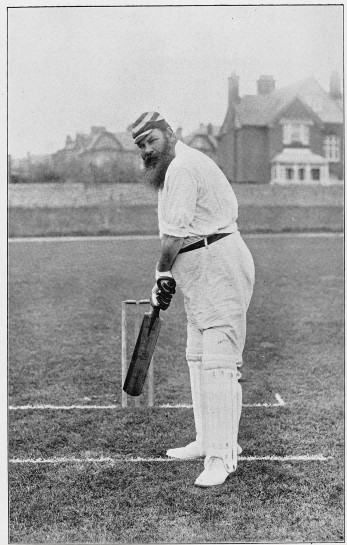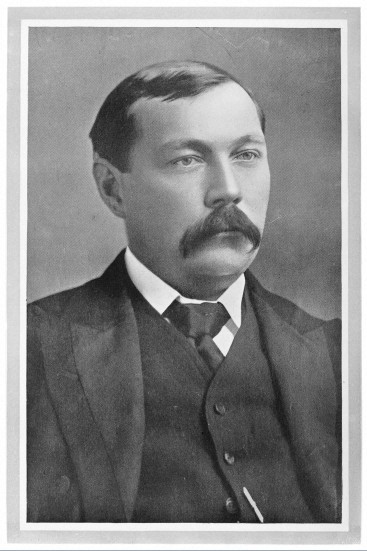Confrontation at Crystal Palace: The Adventure of the Bearded Colossus, Part One


One hundred and ten years ago, two doctors confronted one another in South London. One, in his fifties at the time, was the acknowledged leader in his field. The other, ten years younger, was a few years into a stellar career in a different area. In Upper Norwood’s Crystal Palace Park, a few yards from Benjamin Waterhouse Hawkins’ dinosaur sculptures, in a bowl of land that now houses the famous Crystal Palace athletics track, the two men met head on…
Their meeting – as the mysterious opening paragraph probably indicates – was not to do with any medical issue, and although both are instantly recognisable to this day, in neither case is it for their medical career. The older man is William Gilbert (“W.G.”) Grace, the brilliant cricketer (and general practitioner). The younger is Arthur Conan Doyle, author, general practitioner and one-time eye specialist.
Starred for Gloucestershire
Born in 1848, Grace had starred for Gloucestershire since he was a teenager, chiefly as a batsman but also as a bowler (initially medium-paced, but growing slower as his waistline increased with the years). In 1895, well into his forties, he had had a great “Indian Summer” season, compiling statistics that ranked with any season of his career – for example, he became the first player to score 1000 runs in May, something only two other people have achieved subsequently. In 1899, however, he quarrelled with the authorities at Gloucestershire and became the lynchpin of a new London County Cricket Club, based at Crystal Palace Park. Although he never had another truly great season, even in the twilight of his career he was a feared player: Grace in decline was as good as many players at their best.
Arthur Conan Doyle, by contrast, loved cricket but performed at a much lower level. At this stage in his career, he had already achieved huge success as the creator of Sherlock Holmes. The great detective had made his debut in two novels in the late 1880s but it was when Doyle began to write a series of short stories featuring Holmes for the Strand magazine, the first appearing in summer 1891, that public enthusiasm really went through the roof. The Strand rapidly made the Sherlock Holmes story its lead item, and circulation doubled. Notoriously, Doyle felt Sherlock Holmes was crowding out all his other literary projects and in December 1893 sent him and his arch-rival Professor Moriarty tumbling, apparently to their deaths, into the Reichenbach Falls; the remainder of the 1890s were spent in a variety of literary endeavours, including other mystery stories, historical fiction and tales on medical themes. When the two men met in 1900, in South Africa the Boer War was under way – something to which Doyle gave enthusiastic support – and he had just revived his medical skills to serve as a volunteer doctor at the Longman Hospital in Bloemfontein. In the late summer, he was back in England and back in the area of South London where he had lived with his wife and daughter earlier in his career (there is a blue plaque on Conan Doyle’s old house in Tenison Road, South Norwood, a mile or so to the south of the Park), on a collision course with W.G. Grace.
The big game
Doyle was a member of the Marylebone Cricket Club, and on 23rd-25th August 1900 the MCC took on Grace’s London club in a three-day game at the Crystal Palace. It will not surprise anyone familiar with the English summer to learn that the match was affected by rain – there was no play at all on the first day – and that the two clubs needed to negotiate ways in which the fixture could be brought to a conclusion despite time lost to the weather. Grace agreed to a proposal to extend the final day’s play into the evening to get a result. On the 25th of August, the LCC – who had batted first – were into their second innings. Neither side had scored heavily in the first innings and each had been all out for a very similar figure, so this final day would decide the game. No London batsman was particularly impressive, with the exception of Grace: he scored a century, with his nearest colleague scoring only 36 and all the others struggling to break double figures. Getting Grace out would be crucial for the MCC.
To find out about the game, please follow this link.
This page was originally published by the Wellcome Library, and is reproduced with their permission.
No Comments
Add a comment about this page